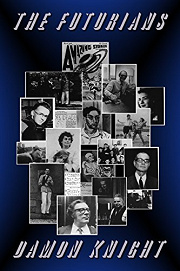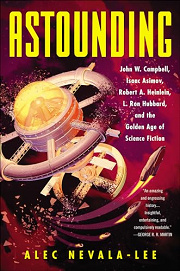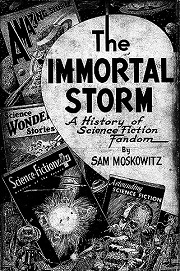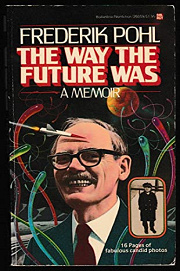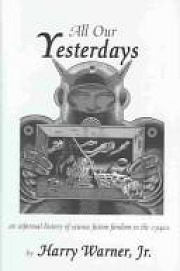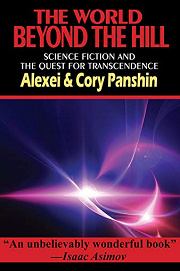Share your thoughts in a quick Shelf Talk!
The Futurians by Damon Knight
Meet the dreamers and firebrands who helped shape modern science fiction—from cramped apartments to magazine offices where the genre’s future was forged. Lively and candid, The Futurians reveals the friendships, feuds, and bold ideas that launched a literary revolution.
Have you read this book? Share what you liked (or didn’t), and we’ll use your answers to recommend your next favorite read!
Love The Futurians but not sure what to read next?
These picks are popular with readers who enjoyed this book. Complete a quick Shelf Talk to get recommendations made just for you! Warning: possible spoilers for The Futurians below.
In The Futurians, did you enjoy ...
... the interwoven lives of Campbell, Asimov, Heinlein, and Hubbard shaping Golden Age SF?
Astounding: John W. Campbell, Isaac Asimov, Robert A. Heinlein, L. Ron Hubbard, and the Golden Age of Science Fiction by Alec Nevala-Lee
If what hooked you in The Futurians was seeing a whole ecology of people—Campbell in the editor’s chair shaping careers, Asimov and Kornbluth trading barbs, Judith Merril pushing boundaries—then Astounding gives you another panoramic, up-close look. Nevala-Lee traces how Campbell’s editorial vision pulled on Asimov, Heinlein, and Hubbard, echoing the same overlapping friendships, rivalries, and midnight apartment debates you read about in Damon Knight’s account. You’ll recognize touchstones like the fallout from the Futurian feuds and Campbell’s sway over magazine-era SF, but from an equally intimate, multi-perspective angle.
... the Futurians–New Fandom feuds and the 1939 Worldcon 'Exclusion Act'?
The Immortal Storm: A History of Science Fiction Fandom by Sam Moskowitz
If the behind-the-scenes knife-fights in The Futurians—especially the Worldcon turmoil where Wollheim and company were barred—made the book irresistible, Moskowitz’s chronicle is the primary-source deep dive into those same battles. He details the schisms with New Fandom, the personalities sparring in club rooms and fanzines, and the maneuvers leading up to the 1939 exclusion episode you saw Knight narrate. It’s the full docket of the political drama that simmered under the friendships, with names like Wollheim, Pohl, and Lowndes front and center.
... Pohl’s wry, first-person anecdotes about Wollheim, Kornbluth, and the Futurian house?
The Way the Future Was by Frederik Pohl
If Knight’s dry zingers and sly asides about Futurian hijinks made you grin, Pohl’s memoir will have you laughing out loud. In The Way the Future Was, he recounts living in the Futurian apartment, hustling magazine gigs, and teaming with C. M. Kornbluth—delivered with the same insider sparkle you enjoyed in stories about Wollheim’s schemes and the group’s endless argument culture. It’s a breezy, confessional complement to the set pieces you remember, told by one of the ringleaders himself.
... voices from fanzines and letters that let fandom speak for itself?
All Our Yesterdays: An Informal History of Science Fiction Fandom in the Forties by Harry Warner, Jr.
If you loved how The Futurians weaves in quotes, fanzine snippets, and contemporaneous voices to let the era breathe, Warner’s history amplifies that chorus. All Our Yesterdays draws heavily on letters and fan publications—many from the very figures Knight profiles—so you can hear the arguments, enthusiasms, and gossip in the participants’ own words. The familiar names—Pohl, Merril, Wollheim, Blish—pop up in the raw, epistolary texture that made Knight’s narrative feel so immediate.
... big-picture analysis connecting SF’s ideas to philosophy and culture?
The World Beyond the Hill by Alexei Panshin and Cory Panshin
If what lingered from The Futurians was the sense that these squabbling roommates were midwives to a sweeping intellectual movement, the Panshins deliver the grand synthesis. The World Beyond the Hill connects the magazines, editors like Campbell, and writers you met—Asimov, Heinlein, Merril—to larger currents in myth, psychology, and cultural history. Where Knight shows you the rooms, arguments, and deadlines, this book shows you the architecture of ideas behind them—and why those Futurian debates mattered.
Unlock your personalized book recommendations! Just take a quick Shelf Talk for The Futurians by Damon Knight. It’s only a few questions and takes less than a minute.
